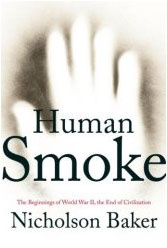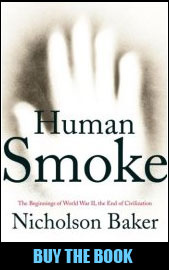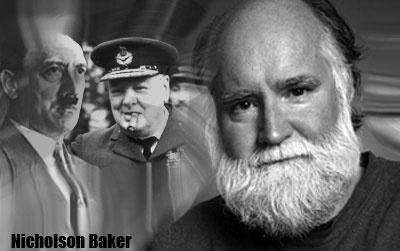 Controversial World War II book questions ‘just war’
Controversial World War II book questions ‘just war’
* Nicholson Baker’s "Human Smoke" looks at the origins of World War II
* He says Winston Churchill and Franklin Roosevelt strengthened Adolf Hitler’s power
* Holocaust scholar says Hitler would not have responded to passivity
* Baker known for "Vox," phone sex novel given to Bill Clinton
Even the staunchest opponents of the wars in Vietnam and Iraq are loath to take issue with World War II, the quintessential conflict between good and evil that became the model of a morally just war.
So it’s no surprise that novelist Nicholson Baker’s latest venture into nonfiction, "Human Smoke," has stirred up strong feelings. After all, he questions the popular notion of the just war and indicates that Winston Churchill and Franklin Roosevelt share blame with Adolf Hitler in setting the stage for the deadliest and most destructive war in history.
Baker makes his case through hundreds of brief vignettes culled from newspapers, diaries and secondary sources that are presented chronologically and without context or commentary by the author. The book ends on December 31, 1941, as the world plunges into the abyss.
In a two-page "afterword," Baker dedicates the book to pacifists who risked public scorn and imprisonment by fighting to stave off the war.
Outraged by the invasion of Iraq, Baker said he was familiar with arguments that some wars had to be fought and that World War II is the premier example.
 "If this is the war that everyone holds up as the benchmark of a morally justified war, let’s look very closely at how it began, let’s find out what happened, in what order and where the moments were that things could have turned out differently.
"If this is the war that everyone holds up as the benchmark of a morally justified war, let’s look very closely at how it began, let’s find out what happened, in what order and where the moments were that things could have turned out differently.
"Let’s ask the question, ‘Was it a good war?’ " he said in an interview at his 18th-century farmhouse in this New Hampshire border town where he and his family have lived for the past decade.
Exploring the origins of World War II may seem something of a reach for an unconventional author known for quirky novels such as "Vox," which details a phone sex conversation and became a footnote to history after it was learned that Monica Lewinsky had given a copy to President Bill Clinton. Another novel, "The Mezzanine," explores the thoughts of an office worker who rides an escalator during his lunch hour.
Baker has written articles in The New Yorker, ranging from the history of the fingernail clipper to the workings of a movie projector, but his best-known shift to nonfiction was the 2001 "Double Fold," which lamented the destruction of newspaper archives and their replacement by microfilm.
It was while tending the British Library newspaper collection that he rescued from the shredder that Baker began reading about "the horrible period" that led to World War II and prompted him to dig deeper and try "to make some sense" of the situation.
Baker said he was surprised and shocked at the way Churchill responded to Hitler’s attacks on Poland and other neighboring states by launching a relentless bombing campaign against German cities as well as a blockade that was designed to starve the enemy into submission.
"He was acting like a bloodthirsty maniac during that period. That has to go back on the record in all of its unpleasantness. We can’t learn from a hero like that. It’s a mistake to say that because Hitler was bad, we have to clean up the image of Churchill. Churchill was also bad," Baker said.
Baker maintains that Churchill’s bellicose actions and Roosevelt’s eagerness to supply Britain with ships and planes served only to prop up Hitler’s standing with Germans and strengthen his hold on the country.
"It was the war — the long, slow war of bombing and blockade — that fundamentally helped to keep Hitler in power," he said. "The fact that the country was attacked night after night in this way released a massive antipathy to the British."
 The people in the book whom Baker looks up to include Mohandas Gandhi, the apostle of nonviolence; Herbert Hoover, who opposed the British blockade; and a handful of lesser-known pacifists who spoke out against the run up to war.
The people in the book whom Baker looks up to include Mohandas Gandhi, the apostle of nonviolence; Herbert Hoover, who opposed the British blockade; and a handful of lesser-known pacifists who spoke out against the run up to war.
Tall and lean, with a full but neatly trimmed white beard, the 51-year-old Baker does not regard himself as "a war-minded person," but neither does he claim to be "an absolute pacifist." He is sympathetic to the Quaker tradition of nonviolence, having had Quaker forebears and having gone to Haverford College, which was founded by Quakers.
"Human Smoke," which draws its title from a description of the ashes at Auschwitz, is not meant to be a comprehensive history. Rather, he said, "it’s just one journey through the thicket of events," one that captures the anguish of the period and puts human faces on those caught up in it.
The book slices and dices the years that led to war into hundreds of little anecdotes rather than a single sweeping narrative. Baker presents the facts in a detached, journalistic manner that belies his underlying passion and leaves it to the reader to sort out contradictions and infer the broader picture.
Reviews, Baker noted, have ranged from "extremely positive" to "ferociously negative." In The New York Times, William Grimes vilified "Human Smoke" as a "self-important, hand-wringing, moral mess of a book." But Colm Toibin, in the newspaper’s Sunday Book Review, called it "riveting and fascinating" and "a serious and conscientious contribution to the debate about pacifism."
Among the skeptics was Holocaust scholar Michael Berenbaum, who helped oversee the creation of the United States Holocaust Memorial Museum.
"If there ever was a war that was worth fighting it was World War II, and there is no evidence that I know of whatsoever that Hitler would have responded to passivity except to regard that as empowering him to expand," Berenbaum said. "Hitler could only be stopped by force."
Editorial Review
Bestselling author Nicholson Baker, recognized as one of the most dexterous and talented writers in America today, has created a compelling work of nonfiction bound to provoke discussion and controversy — a wide-ranging, astonishingly fresh perspective on the political and social landscape that gave rise to World War II.
Human Smoke delivers a closely textured, deeply moving indictment of the treasured myths that have romanticized much of the 1930s and ’40s. Incorporating meticulous research and well-documented sources — including newspaper and magazine articles, radio speeches, memoirs, and diaries — the book juxtaposes hundreds of interrelated moments of decision, brutality, suffering, and mercy. Vivid glimpses of political leaders and their dissenters illuminate and examine the gradual, horrifying advance toward overt global war and Holocaust.
Praised by critics and readers alike for his exquisitely observant eye and deft, inimitable prose, Baker has assembled a narrative within Human Smoke that unfolds gracefully, tragically, and persuasively. This is an unforgettable book that makes a profound impact on our perceptions of historical events and mourns the unthinkable loss humanity has borne at its own hand.
BUY THE BOOK

Interview with Amazon.com
Amazon.com: This is obviously a big departure for you, in both style and subject. How did the project come about, and how did it find this form?
Baker: I was writing a different book, on a smaller historical subject, when I stopped and asked: Do I understand World War Two? And of course I didn’t. Also I’d been reading newspapers from the thirties and forties, and I knew that there were startling things in them.
In earlier books, I’ve looked closely at moments to see why they matter, and I’ve tried to rescue things, people, ideas from overfamiliarity. So in a way a book like this–which moves a loupe over some incidents along the way to a much-chronicled war–was a natural topic.
But yes, the style is a departure: it’s very simple here out of respect for the hellishness of the story that I’m trying to assemble, piece by piece.
Amazon.com: Why World War Two in particular?
Baker: Politicians constantly fondle a small, clean, paperweight version of this war, as if it provides them with moral clarity. We know that it was the most destructive five year period in history. It was destructive of human lives, and also of shelter, sleep, warmth, gentleness, mercy, political refuge, rational discussion, legal process, civil tradition, and public truth. Millions of people were gassed, shot, starved, and worked to death by a paranoid fanatic. The war’s victims felt as if they’d come to the end of civilization.
But then we also say that because it turned out so badly, it was the one just, necessary war. We acknowledge that it was the worst catastrophe in the history of humanity–and yet it was "the good war." The Greatest Generation fought it, and a generation of people was wiped out.
If we don’t try to understand this one war better–understand it not in the sense of coming up with elaborate mechanistic theories of causation, but understand it in the humbler sense of feeling our way through its enormity–then cartoon versions of what happened will continue to distort debates about the merits of all future wars.
Amazon.com: You largely kept your own opinions out of the text, except for the choices you made in what to include and a few editorial comments here and there, as well as your short Afterword at the end. It makes for a real tension between the neutral tone and the sense, at least on the part of this reader, that there are some passionate opinions behind it. What authorial role did you want to establish?
Baker: I found that my own cries of grief, amazement, or outrage–or of admiration at some quiet heroism–took away from the chaos of individual decisions that move events forward.
It helps sometimes to look at an action–compassionate, murderous, confessional, obfuscatory–out of context: as something that somebody did one day. The one-day-ness of history is often lost in traditional histories, because paragraphs and sections are organized by theme: attack, counterattack, argument, counterargument. That’s a reasonable way to proceed, but I rejected it here for several reasons. First, because it fails to convey the hugeness and confusion of the time as it was experienced by people who lived through it. And, second, because I wanted the reader to have to form, and then jettison, and then re-form, explanations and mini-narratives along the way–as I did, and as did a newspaper reader in, say, New York City in September, 1941.
I think the pared-down, episodic style allowed me to offer some moments of truth that I wouldn’t have been able to offer had I had uppermost in my mind the necessity of making transitions and smoothing out inconsistencies and sounding like me. I offer no organized argument: I want above all to fill the readers mind with an anguished sense of what happened.
Amazon.com: I was telling someone about your book and how it failed to convince me of what I took to be its thesis, and his response was, "Wow, you really made me want to read it." And that’s my response too: if your point was to convince me that we shouldn’t have fought World War II, then the book didn’t work, but I’m still very glad I read it. But maybe that wasn’t your point at all.
Baker: I’m really pleased that you responded that way. I didn’t want to convince, but only to add enriching complication. Long ago I wrote an essay called "Changes of Mind" in which I tried to talk about how gradual and complicated a shift of conviction can be. I left overt opinionizing out of this book so that a reader can draw his or her own conclusions, folding in other knowledge.
There are many books about the war that I value highly even though I don’t agree with the world-outlook of the people who wrote them. To take a major example: Churchill’s own memoir-history is completely fascinating and revealing–and a great pleasure to read–although I happen to think that Churchill was himself a bad war leader.
There’s no point in trying to use a book to replace one simple set of beliefs about World War Two with another simple set of beliefs. The war years are alive with contradictions and puzzles and shake-your-head-in-wonder moments. You’re going to look at it in different ways on different days because you’re going to have different moments uppermost in your mind.
On the other hand, I don’t want to hide what I think. Here’s what I am, more or less: I’m a non-religious pacifist who is sympathetic to Quaker notions of nonviolent resistance and of refuge and aid for those who need help. I find appealing what Christopher Isherwood called "the plain moral stand against killing." I don’t expect people to look at things this way, necessarily–after all, it took me a while to get there myself. But I do hope that my book will offer some thought-provocations that anyone, of any ideological persuasion, will want to mull over.
Amazon.com: It’s hard to believe there’s something new to say about what may be the most written-about event in human history. What did you feel about approaching such a well-chronicled subject? What were you most surprised to find? What responses have you gotten from historians and other readers?
Baker: There were many surprises. For instance, I didn’t expect Herbert Hoover, who argued for the lifting of the British blockade in order to get food to Jews in Polish ghettoes and French concentration camps, to be a voice of reason and compassion. I didn’t know that German propagandists used the phrase "iron curtain" before Churchill did. I didn’t know that in 1940 the Royal Air Force tried to set fire to the forests of Germany. I didn’t know how interested the United States government was in arming China. I didn’t know how public was Japan’s unhappiness with the American oil embargo. I didn’t know that many of the people who worked hardest to help Jews escape Hitler were pacifists, not interventionists.
I’ve had interesting reactions from historians, who seem to understand (for the most part) that I’m not trying to write a comprehensive history of the beginnings of the war. I’ve had some very good reviews and some very bad ones. The bad ones seem to follow the teeter-totter school: that if a dictator and the nation he controls is evil, then the leader of the nation who opposes the evil dictator must be good. Life isn’t that way, of course. There is in fact no "moral equivalence" created by examining coterminous violent and repulsive acts. The notion of moral equivalence is a mistake, because it undermines our notions of personal responsibility and law. Each act of killing is its own act, not something to be heaped like produce on a balancing scale. One person, as Roosevelt said, must not be punished for the deed of another–though he didn’t follow his own precept.
Gandhi comes up sometimes. It was said in a review that I "adore" Gandhi. That’s not quite right. Gandhi is in many ways an admirable and perceptive man. He spoke gently even while thousands of his supporters were in jail and his country was being bombed by an occupying power. But the years told on him, and he sometimes came to sound, as Nehru once observed in a memoir, cold–indifferent to suffering. He is one voice, and a voice worth listening to.
My real heroes, though, are people like Victor Klemperer, who responded to Hitlerian terror not with counterviolence, but with beautiful nonresistance: by writing a masterpiece of a diary. He and Romanian diarist Mihael Sebastian have the last word for that reason. And I’ve dedicated the book to British and American pacifists–I want this book to rescue the memory of their loving, troubled efforts to help.
The most interesting and helpful set of responses to the book so far has been at www.edrants.com, where a group of participants discussed Human Smoke for a week, adding all kinds of thoughts, analogies, comparisons, and criticisms. I’ve never been through anything like it before, and I’m the better for it.
Amazon.com: Your recent celebration of Wikipedia in the New York Review of Books has gotten a lot of attention (deservedly so). Did the style and philosophy of Wikipedia influence the way you wrote Human Smoke? Have you made any Wikipedia updates based on what you found in your research.
Baker: I used Wikipedia during the writing of the book, especially to check facts about subtypes of airplanes and ships–e.g., the Bristol Beaufighter I cited in the first paragraph of the review. Wikipedia is amazingly strong and precise on military hardware. (And on when a British Lord became a Viscount, and on a million other things.) But I’ve been writing movies, and the model I often had in my mind while working on Human Smoke was the movie documentary–in which short scenes and clips follow each other with a minimum of narration.
BUY THE BOOK
ATTENTION READERS
We See The World From All Sides and Want YOU To Be Fully InformedIn fact, intentional disinformation is a disgraceful scourge in media today. So to assuage any possible errant incorrect information posted herein, we strongly encourage you to seek corroboration from other non-VT sources before forming an educated opinion.
About VT - Policies & Disclosures - Comment Policy



